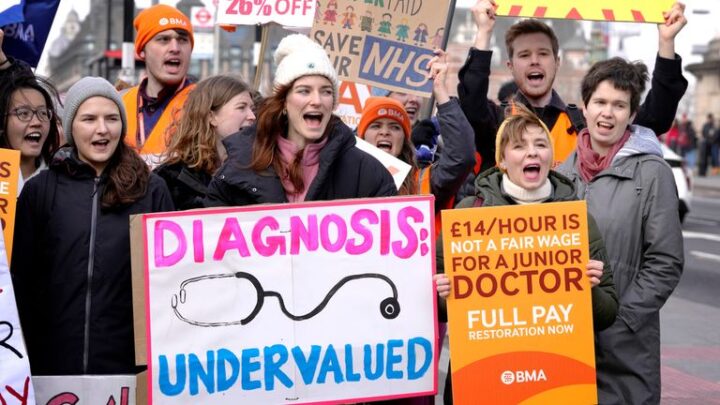UK Doctors on strike over pay rise. June 14, 2023 (AP)
Up to 47,600 junior doctors who are members of the British medical association (BMA), embarked on a strike on Wednesday over a demand for increased salaries.
The strike which began at 7 am on Wednesday will end at 7 am on June 17.
The union said junior doctors have suffered a “pay erosion” of 26 percent over the last 15 years, as their wages have failed to keep up with inflation.
They are demanding a 35 percent pay rise to reverse this.
Advertisement
The junior doctors had previously gone on strike for 96 hours in April and 72 hours in March for the same reason.
But after weeks of negotiations, the BMA said the government offered only a 5 percent pay rise. They said the offer is “paltry” and “in no way credible”.
The union threatened that if the government does not improve their offer, junior doctors will strike for a minimum of three days every month over the summer.
Advertisement
In a letter to Prime Minister Rishi Sunak on Wednesday, Phil Banfield, BMA council chair, said it is incredibly disappointing that the doctors have been forced to strike in order to get the government to listen and understand the realities of how desperate things have become on the frontlines of the National Health Service (NHS).
“You told the public that the NHS is safe in your hands and your chancellor, as chair of the health and social care select committee, called for action to better value staff to help address the workforce crisis and protect patient safety,” the letter reads.
“Yet, doctors are increasingly demoralised by growing waiting lists and the falling value of their pay.
“I urge you to listen to our doctors and to meet with me and our junior doctors as soon as possible to find a way forward and for your government to recognise the impact of pay erosion and accept that this must be addressed.”
Advertisement
Stephen Powis, NHS England’s national medical director, said almost all routine or pre-planned care could be impacted in some way, adding that thousands of routine procedures have already been rescheduled.
“The strike will have an enormous impact on routine care for patients and on the waiting list, as procedures can take time to rearrange with multiple teams involved.
“Emergency, urgent and critical care will be prioritised during the strike,” he added.
Advertisement
Add a comment






